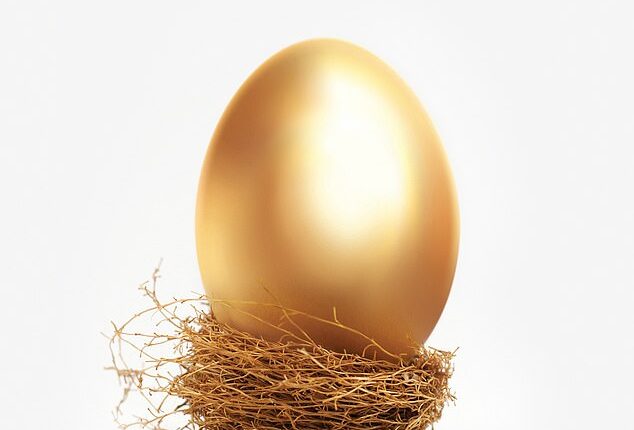
Getting the best return on our hard-earned money is more important than ever with inflation so high. But it can be difficult to know where it has the best chance of growing.
Anyone who invested in property has done well, but the tax benefits of a pension and flexibility of an Isa should not be overlooked.
Pensions are about to become even more generous on tax after the Chancellor announced a round of reforms in a bid to keep people in work longer.
So has this given pensions a new edge? Cody Beecham, author of the blog Personal Finance Guru, says that determining which investment is the best over time depends on many factors, such as your financial goals, tolerance to risk and how long you can leave it untouched.


Pensions are about to become even more generous on tax after the Chancellor announced a round of reforms in a bid to keep people in work longer
Figures compiled for Money Mail by wealth manager Saltus show that someone with a £20,000 lump sum to invest would have made the highest gains over the last two decades if they had put it in a pension.
However, in reality it’s not that simple. Those who used their £20,000 to buy a £200,000 mortgaged buy-to-let would have gained the full value of the property price rise when they come to sell, not just the increase in value of their original stake, because you are effectively pocketing a profit on borrowed money (the mortgage).
In very simplistic terms, if 20 years ago you invested £20,000 into a pension, it would be worth just over £88,000 today. It would be worth £70,400 in a stocks and shares Isa. If you’d bought a property for £200,000, the £20,000 portion would have a value of just under £46,000. However, the entire property would be worth half a million pounds delivering you a massive £300,000 gain.
Here is how each asset stacks up:
Pension
You can invest in a self-invested personal pension (Sipp), or put more money into your workplace pension, which is a pot of money invested for your retirement. You can only access it at 55 this is expected to rise in future years.
PROS: You get tax relief on any contributions you make, and the funds grow tax-free until retirement. This means it costs a basic-rate taxpayer just 80p to put £1 into a pension. For a higher-rate taxpayer it costs 60p, and for a top-rate taxpayer it’s 55p.
The amount you can pay into your pot tax-free each year, known as the ‘annual allowance’, will increase from £40,000 to £60,000 from April 6.
As of the new tax year, punitive charges under the ‘lifetime allowance’ will be axed. This allowance capped the amount you can have in your pension tax free at £1,073,100, above which you would be charged up to 55 pc tax.
CONS: Pensions can be inflexible. You cannot access them until age 55. You are also limited in how much you can contribute each year £40,000 for the current tax year. However, this will rise to £60,000 from April 6. Only a quarter of your pension fund can be withdrawn taxfree. The rest is taxed at your highest marginal rate of tax at the time.
Repeated changes to the pensions system and constantly moving goalposts have made it difficult for savers to plan ahead.
RETURNS: Saltus calculates that £20,000 invested 20 years ago in an average pension fund with 40 pc to 85 pc in shares and the rest in bonds would be worth £88,000 today. This assumes the pension saver is a higher-rate taxpayer.
Property
Many people see their house as their best investment, but the truth is that you will always need a home. Purchasing a buy-to-let property is a more realistic investment option. PROS: Property values tend to rise, so it is a difficult asset class to argue against as an investment.
Most people will use a buy-to-let mortgage to fund an investment. When the property is sold, the buyto-let landlord pockets the capital gain, as well benefitting from rental income over time.
CONS: Changes to the tax treatment of buy-to-let property have made this type of investment less favourable, while risk comes from possible void periods when no rental is earned, issues with tenants and rising mortgage rates. RETURNS: A £200,000 property bought 20 years ago with a £20,000 deposit would now be worth around £460,000, giving a gain of £440,000.
However, this does not account for rental income, taxation, expenses, or interest on your buy-to-let mortgage although stamp duty and capital gains tax have been included.
ISA
Any money invested in an Isa can grow free of tax whether it is invested in stocks and shares or saved in cash. This means that you will not be taxed when you decide to withdraw your savings.
PROS: These tax-friendly accounts are flexible because you can dip into your money as and when you like, unlike property or pensions. CONS: Unlike with a pension there is no tax relief on contributions made into Isas, and you can only contribute a total of £20,000 a year.
RETURNS: £20,000 invested 20 years ago in an average fund would now be worth £70,474. However, there is no additional tax to pay when the money is taken, as there is with a pension.









